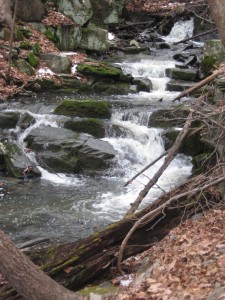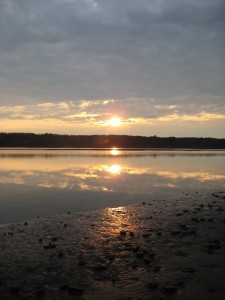The birth of “I,” nature’s seedling of evolutionary advance, finds itself now on the brink of a great correction, the positive outcome of destruction. And what is it that needs reformation in nature’s great experiment, the ego? The answer lies in its reorientation.

– Photo by Jan Ketchel
Ego had its traumatic birth as it was cast from the Garden to find its own way. Estranged from the immediate guidance of the great archetypes—instinctual ways of successfully living through millennia—it was forced instead to chart its own course, a mighty tall order indeed for such an inexperienced infant.
Ego, in its infancy, has no choice but to inflate itself: “I can handle this. I am equal to the situation. I can figure out a better way.” These were the attitudes ego had access to, lacking the old automatic connection to all-knowing nature. Ego had to pretend or, with science, definitively believe that it could unlock and direct the mysteries and treasures of nature to better advantage. How better illustrated is the culmination of this ego inflation than the party of little Nero’s we see strutting their stuff in the current political circus? Unfortunately they only mirror the true state of the collective world ego that tends to project its shadow onto those who willingly parade as fools.
We all share in this ego dilemma and this is our advantage: as within, so without. We, each and every one of us, share in this inflated ego dilemma and, therefore, are all equally able to participate in the great ego reformation that will accompany our deeply transforming planet into new life.
So what is needed for this reformation?
We may be the “brains” of the planet, but we certainly have not acted with much intelligence. Our orientation has primarily been narcissistic and dissociated; narcissistic in our tribal self-centeredness and dissociated from the greater body that supports us: Planet Earth.
As the brains of the operation, we must first re-associate with the rest of the greater physical body of earth and accept that we are in and part of that body. The Hindus and the shamans agree: until we die, our subtle energy body—the brain or spirit—is inseparable from the physical body. Though we certainly can journey beyond the body while in this life, it is only in death that we truly do part. Consequently, our intelligence must be focused on the needs of the body, individual and worldly, while we are here. Actions and decisions must be in conformity with the true needs of the body and not separate from it.
This is the essence of Taoism: actions that flow with the natural course of the river. Spirited attempts to change the course of a river for private enterprise violate the needs of the greater whole and represent the actions of an inflated, dissociated ego.

– Photo by Jan Ketchel
Reconnection to the deepest rivers of the archetypes—the instinctual ways—ready to once again serve the true needs of the greater, full Self, is the new orientation that collective ego is flowing towards, albeit through Mother Earth’s initiation of environmental upheaval. Surrendering to the truth is the only intelligent option, and it is the option survival is moving us towards.
We are all participants in this great ego reformation every day, in every decision we make. This is true democracy. Every life counts, every decision counts. Every right action, however minute, accrues in the world bank of survival and transformation. All donations greatly appreciated.
On my way to the bank,
Chuck
